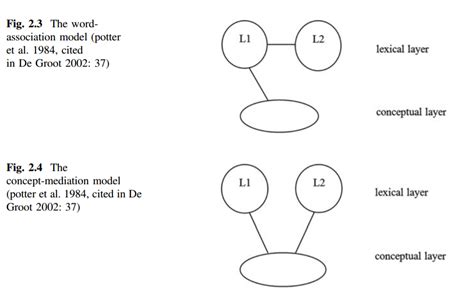Learning a language can be a difficult task, and the decision between using a learner’s first language (L1) or a second language (L2) for it can be daunting. Understanding the differences between L1 and L2 is key to deciding which language to learn.
L1 is the language the learner is most comfortable with and often the language the learner was brought up speaking. This language is usually learned naturally and intuitively rather than actively and formally. Many people use the terms “native language” and “mother tongue” interchangeably with L1. L2, on the other hand, is the language the learner is learning. It is usually learned formally, actively, and sometimes consciously.
The main difference between L1 and L2 is the level of complexity. L1 is typically learned much faster and easier than L2. This is because it has been learned and used since childhood, and the learner has a much better understanding of its structure and grammar. L2, on the other hand, may take a while to learn and is often more difficult for the learner to comprehend.
When deciding which language to learn, it is important to consider the purpose of learning the language. If the learner’s goal is to achieve fluency in the language, then it might be best to choose L2. If the learner’s goal is to learn the basics of the language, then L1 may be a better option. Additionally, it is important to consider the learning environment. Are there native speakers of the language around to help the learner learn? If so, then L2 may be the better option. If not, then L1 may be the better option.
Learning a language can be a challenging but rewarding experience. Understanding the differences between L1 and L2 is the first step in deciding which language to learn. Taking into consideration the purpose of learning the language and the learning environment can help make the decision easier.
Essential Guide To Understanding The Difference Between L1 And L2
If you’re trying to make sense of language learning, you may have heard terms like L1 and L2 and wonder what they mean. L1 and L2 are two different languages and each has its own unique characteristics and features. In this essential guide, we’ll explore the difference between L1 and L2 to help you decide which one is right for you.
The primary difference between L1 and L2 is that L1 is a first language, usually learned from birth. It’s the language that comes naturally to an individual and is spoken by the majority in a language area. L2, on the other hand, is a second language, usually learned in a classroom setting or through immersion. It’s the language that an individual is actively learning and is spoken in the minority in a language area.
The other major difference between L1 and L2 is the level of fluency. L1 speakers tend to have a greater level of fluency than L2 speakers. This is because L1 is a language that has been learned naturally from birth. It’s also a language that has been used for many years and is familiar to the speaker. L2, on the other hand, is a language that is still being learned and may not be as familiar or comfortable for the speaker.
When deciding which language to learn, it’s important to consider your learning style as well as the type of language you are trying to learn. If you’re looking to learn a language for practical purposes, such as travel or business, L2 is often the better choice. The language is typically more widely used and is the language of choice for many international organizations. On the other hand, if you’re looking for a more conversational language, such as for speaking with friends or family, L1 is often the better choice. It’s the language that is most familiar and comfortable for the speaker.
In addition to the this, there are several other factors to consider when deciding between L1 and L2. These include the availability of resources, the cost of materials, and the level of support available. It’s important to research the language and the resources available to help you decide which language is right for you.
Overall, the decision between L1 and L2 depends on your individual needs and preferences. L1 is the language that comes naturally and is often more comfortable for the speaker. L2 is the language that is more widely used and can be beneficial for practical purposes. Consider your learning style, the availability of resources, and the cost of materials before making your decision.
We hope this essential guide to understanding the difference between L1 and L2 has been helpful.
Exploring The Benefits And Limitations Of Using Either L1 Or L2
When it comes to learning a new language, one of the most important decisions you can make is whether to learn that language through your native language (L1) or through a second language (L2). Both approaches have their own benefits and limitations, and understanding these can help you decide which route is the best for you.
The obvious advantage of using L1 is that it can be much easier to learn a language if you already have a good understanding of the language your using to learn it. This is because you already have a basic knowledge and understanding of the language, which can make the process of learning the new language much faster. Additionally, learning a language through L1 makes it easier for you to pick up the nuances of the language, such as the idioms and colloquialisms.
The main limitation of using L1 is that it can restrict your abilities as a language learner. It can be difficult to learn a language if you are too reliant on your native language, as it can cause you to think in your native language rather than the language you’re learning. This has the potential to limit your understanding of the language and can hinder you from truly mastering it.
Using L2 as your primary language to learn a language can also have its advantages and disadvantages. The main advantage of learning a language through L2 is that it can open up a new way of looking at the language and can help you to gain a more comprehensive understanding of it. Additionally, it can help you to interact with other language learners, as your shared language can be used as a form of communication.
The main limitation of learning a language through L2 is that it can be much more difficult to learn a language this way, as you don’t have the same familiarity with the language you’re learning. This means you may have to spend more time and effort to learn the language, as you’ll need to understand the new language’s grammar and vocabulary. Additionally, it can be difficult to use L2 as a form of communication with native speakers, as they may not be comfortable conversing with someone who is learning their language in this way.
At the end of the day, it’s up to you to decide whether to use L1 or L2 to learn a new language. Both approaches have their own advantages and limitations, and understanding these can help you decide which route is the best for you.
L1 is the native language of a person, while L2 is a language learned by a person after their primary language.
In general, L1 should be used for conversational settings, while L2 should be used in formal settings.
Using L1 can help a person feel more comfortable and confident to express their thoughts and feelings.
Using L2 can help a person to sound more professional and to be able to communicate with a wider range of people.
The best way to learn any language is to immerse oneself in the language, through reading, writing, listening and speaking.
Both L1 and L2 can be used in everyday life by speaking with native speakers and practicing the language through different activities.
It depends on the individual, but some of the best materials to use when learning a language are books, movies, podcasts, and online courses.
In general, it is best to use L2 to practice grammar, as this will help to reinforce the language and allow for easier comprehension of the rules.
Yes, it is possible to use both L1 and L2 for communication, depending on the situation.
The best way to improve any language skills is to practice consistently and to immerse oneself in the language through reading, writing, listening and speaking.






